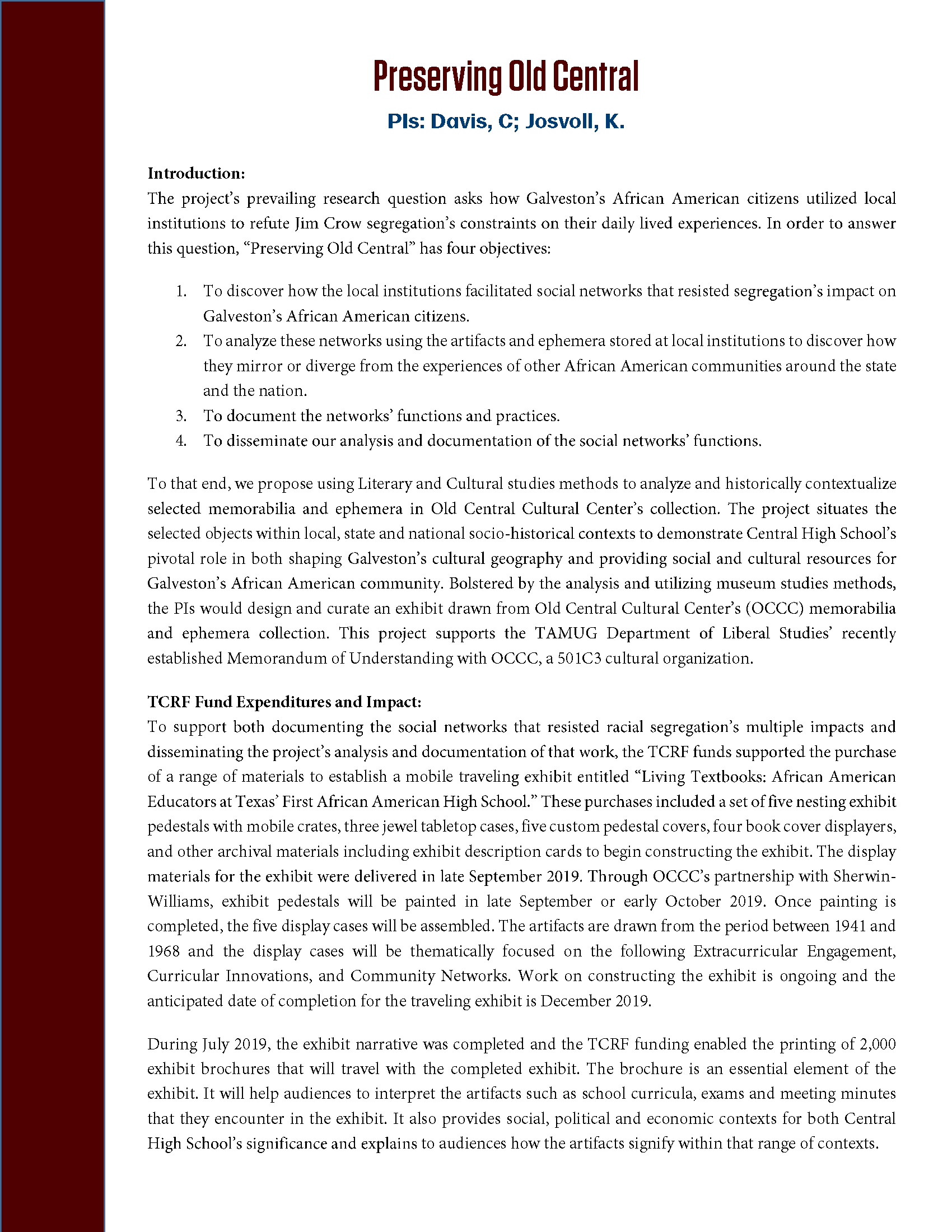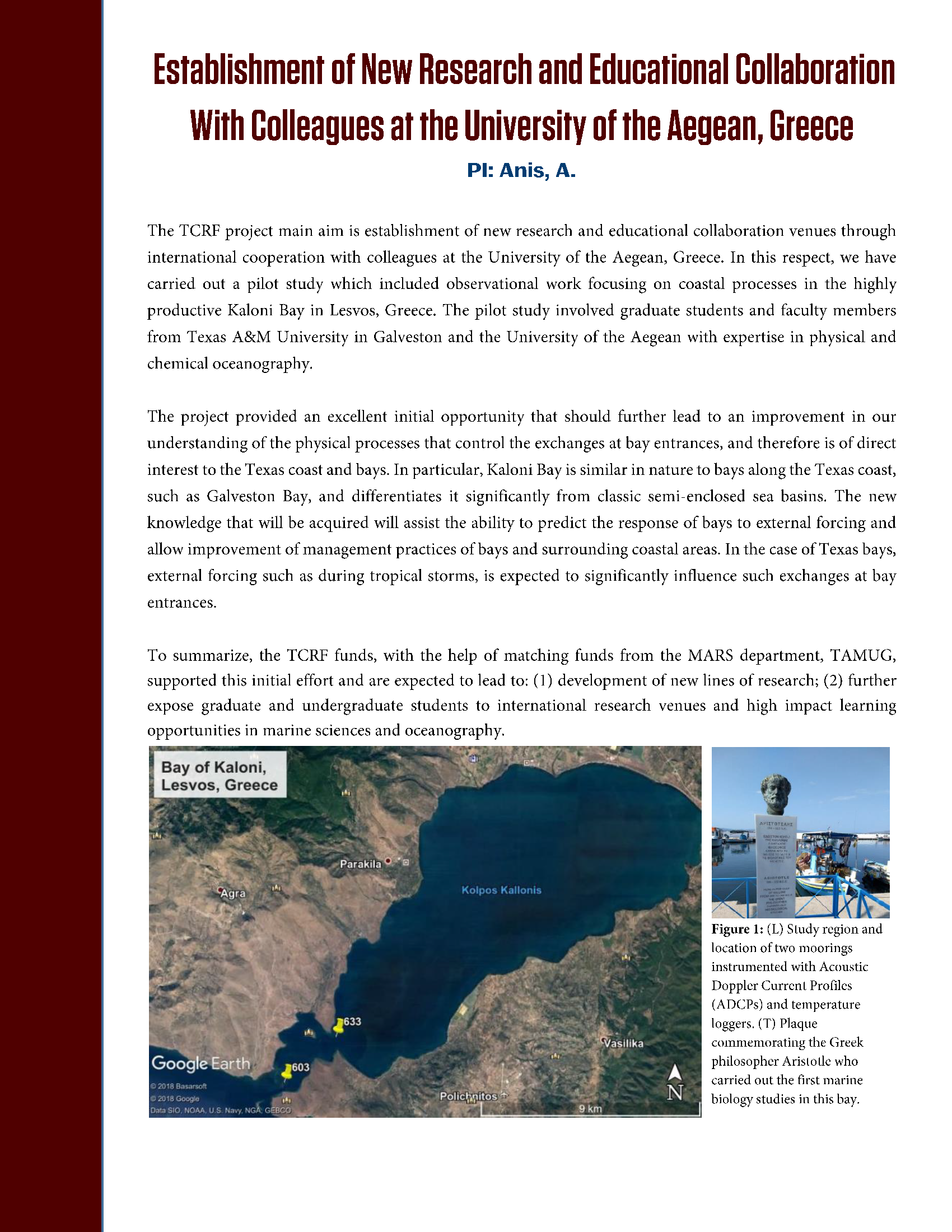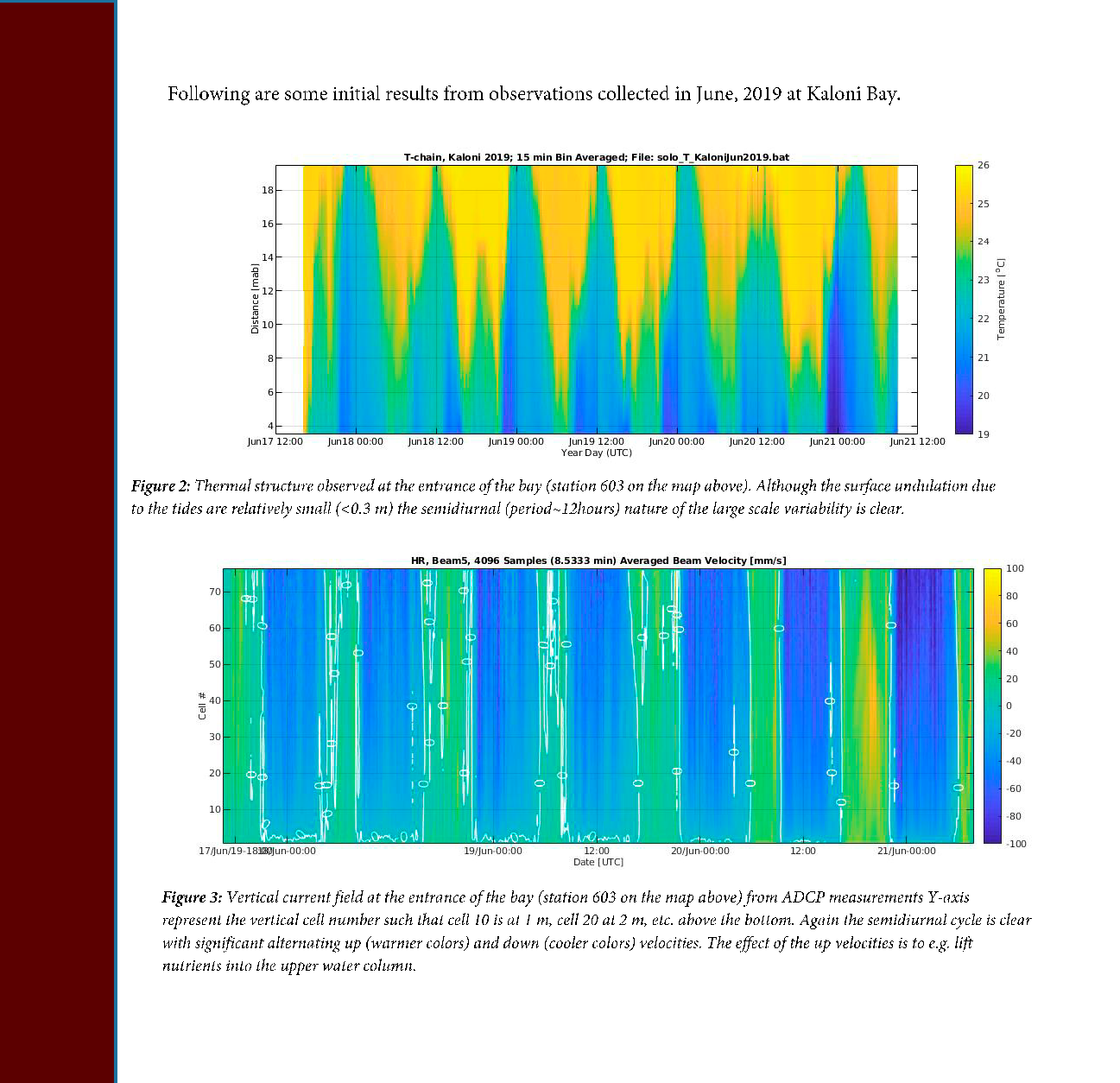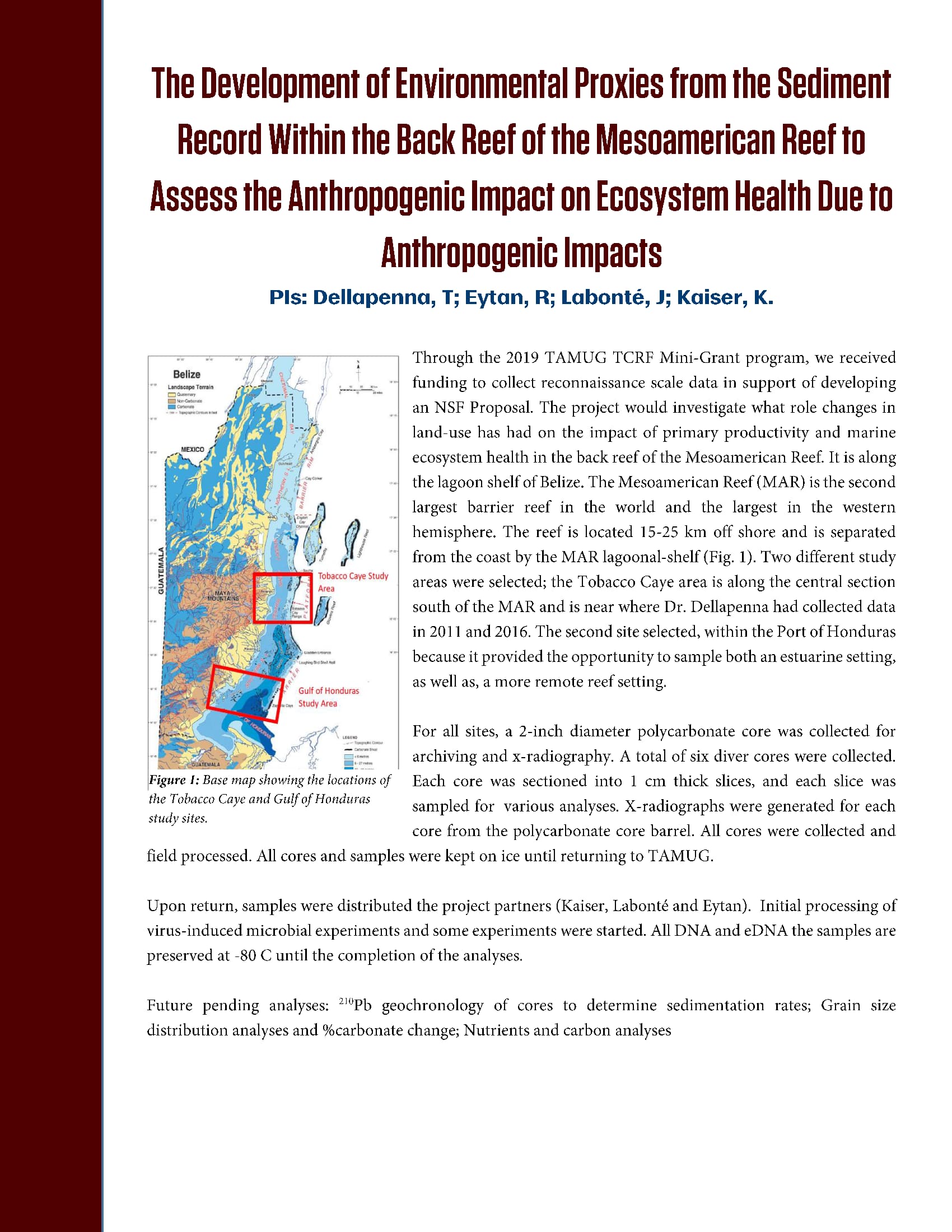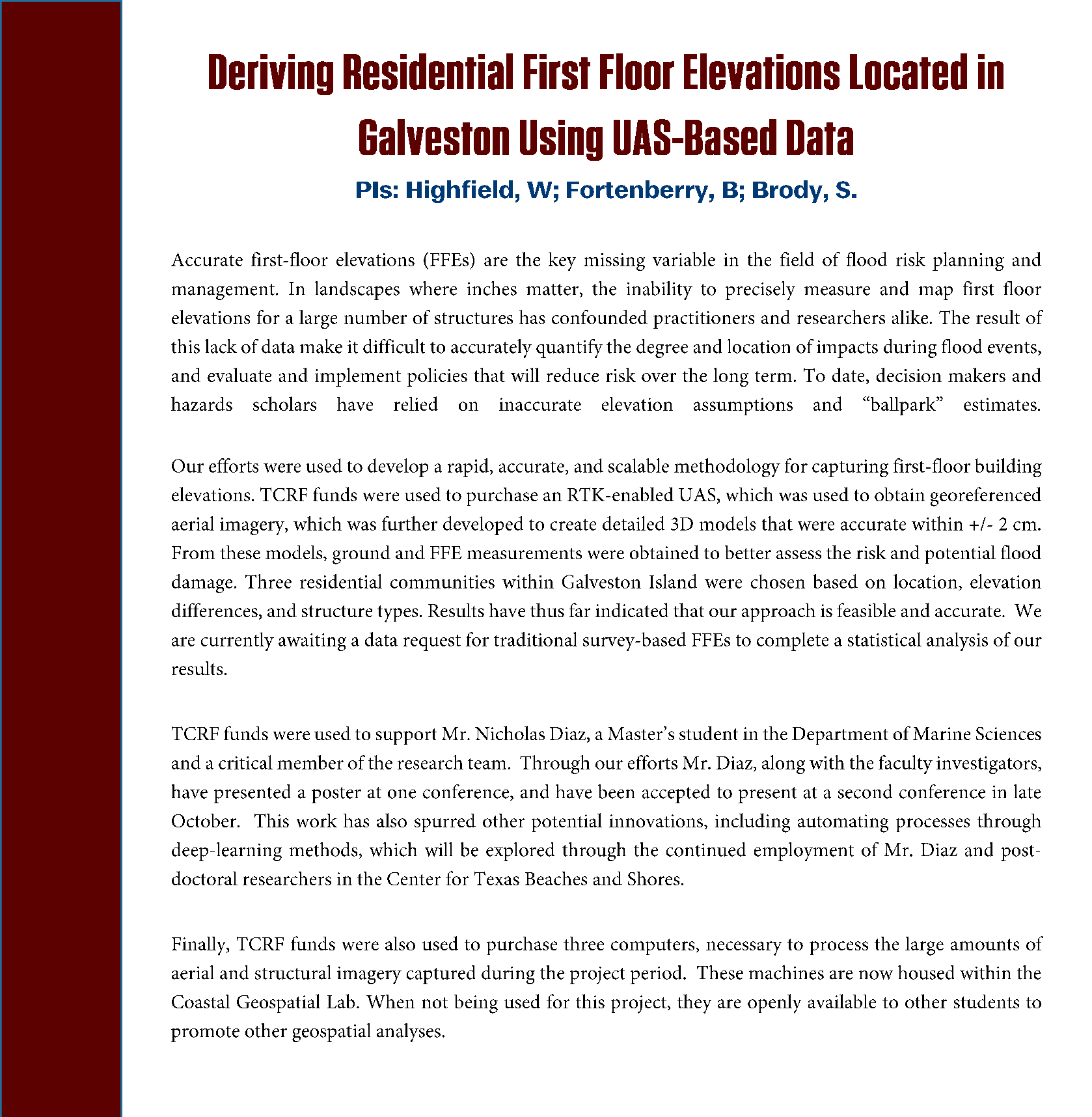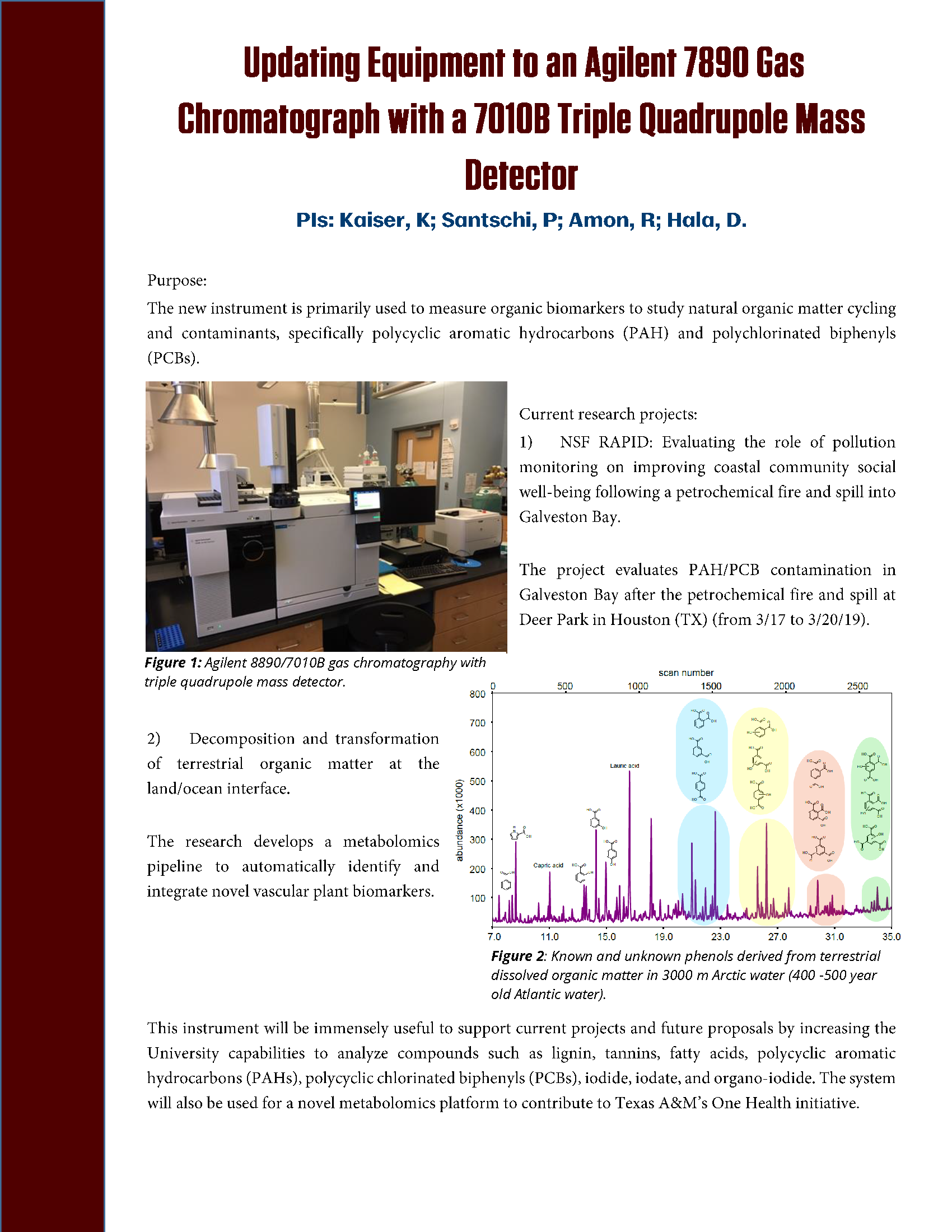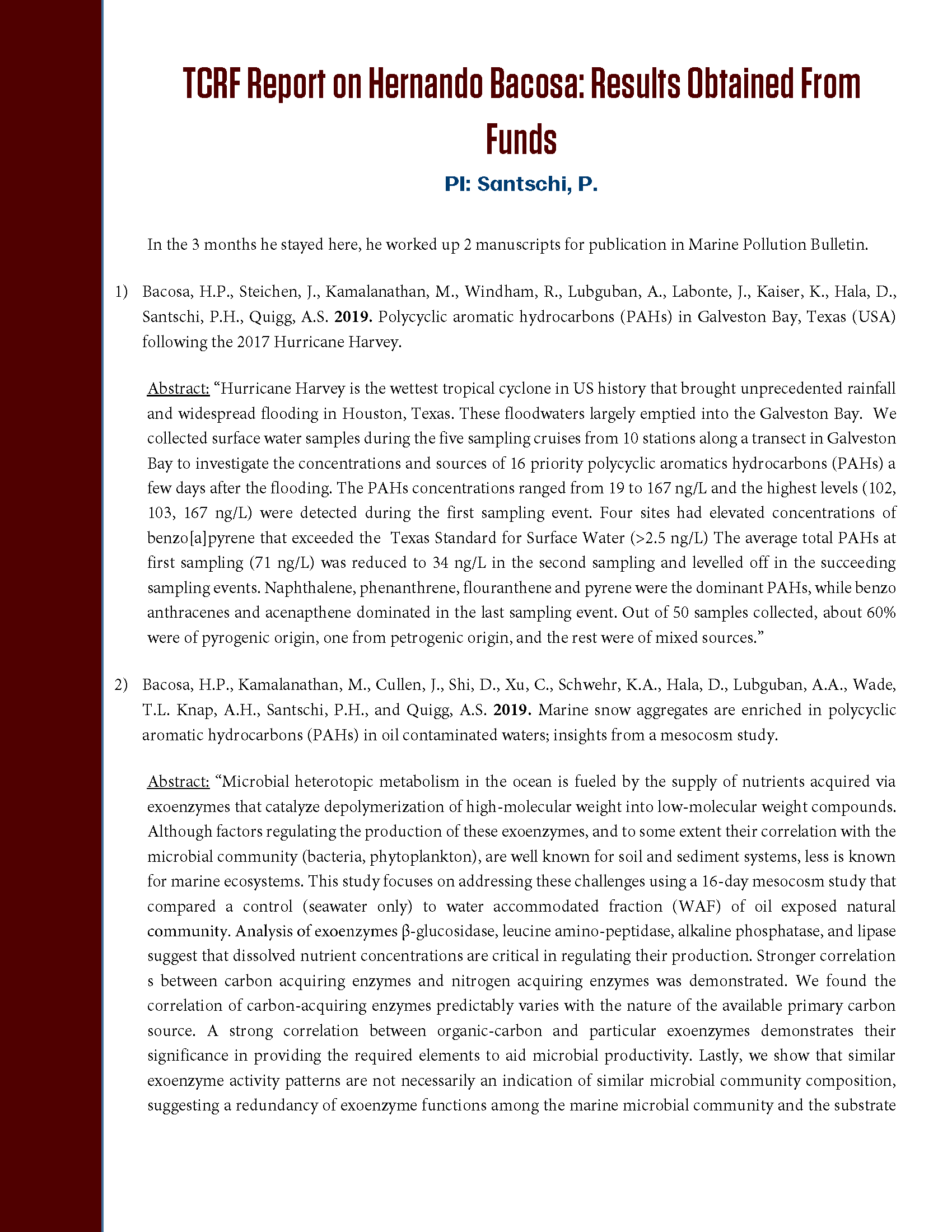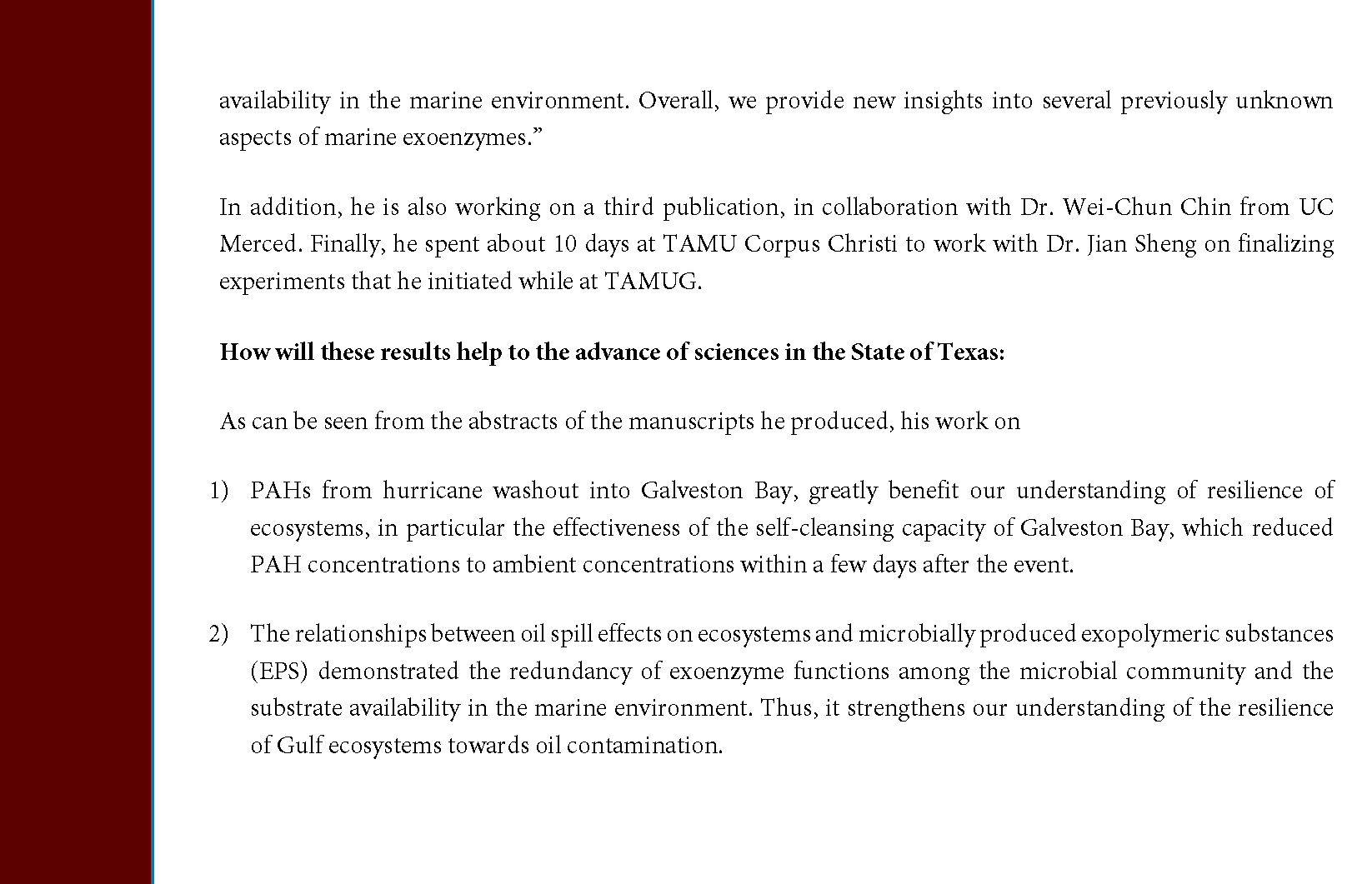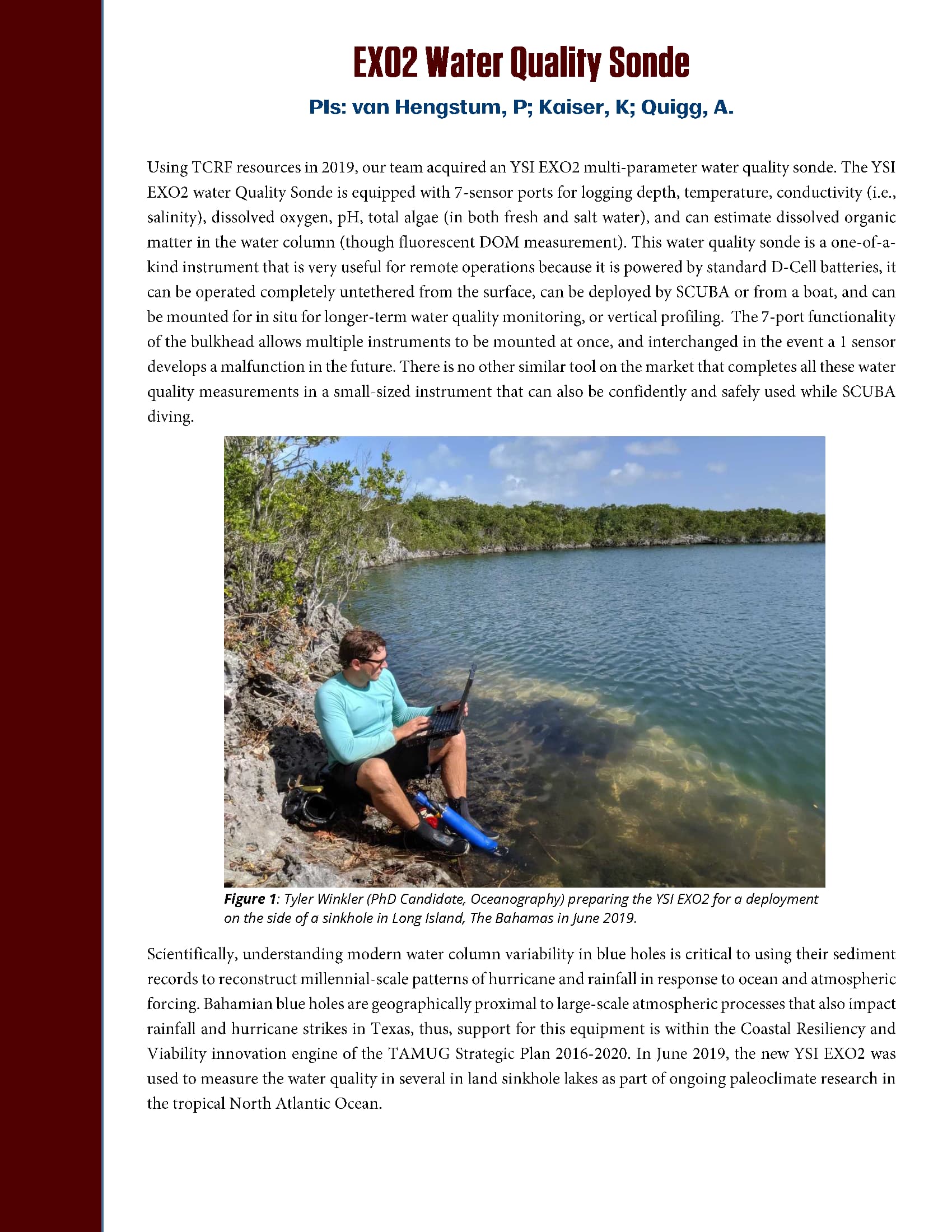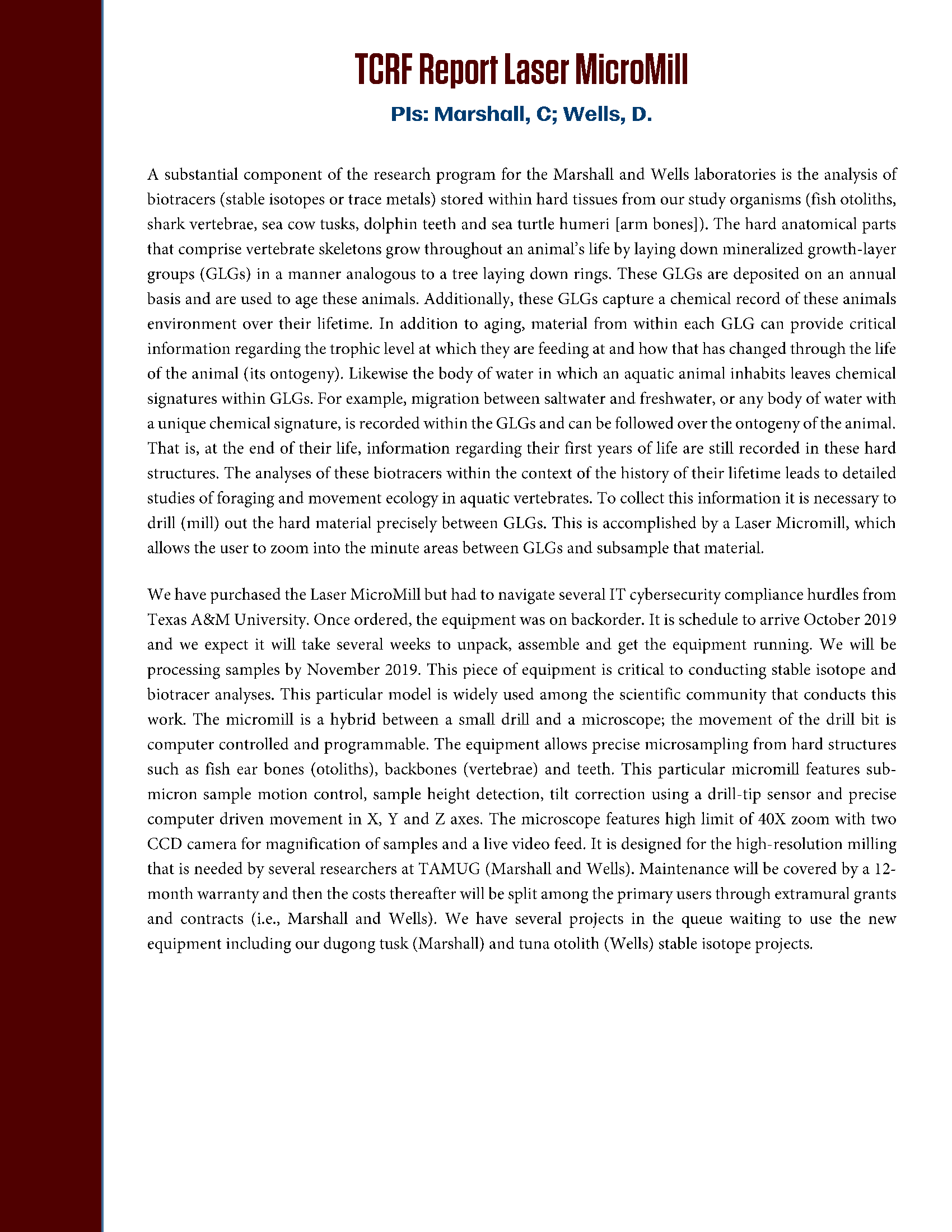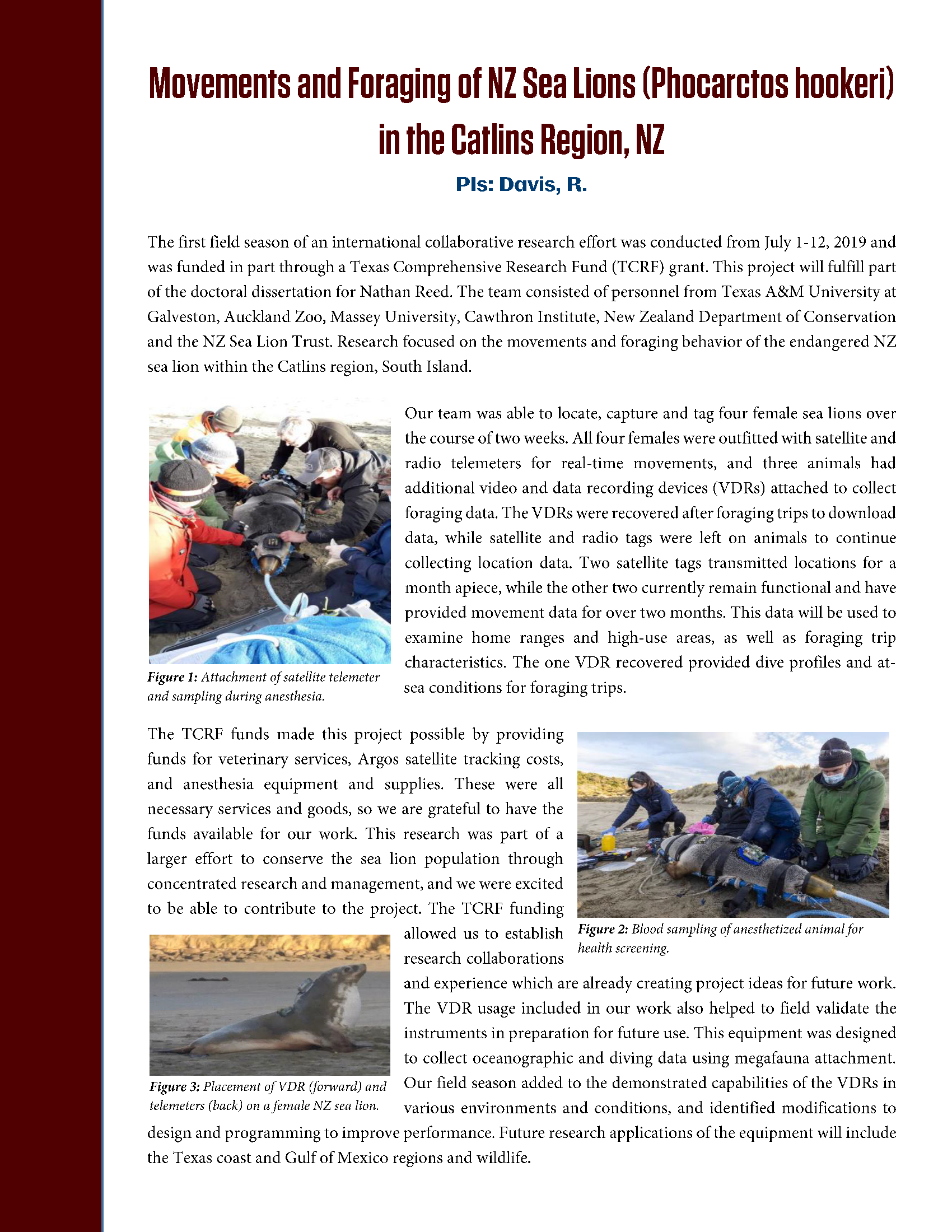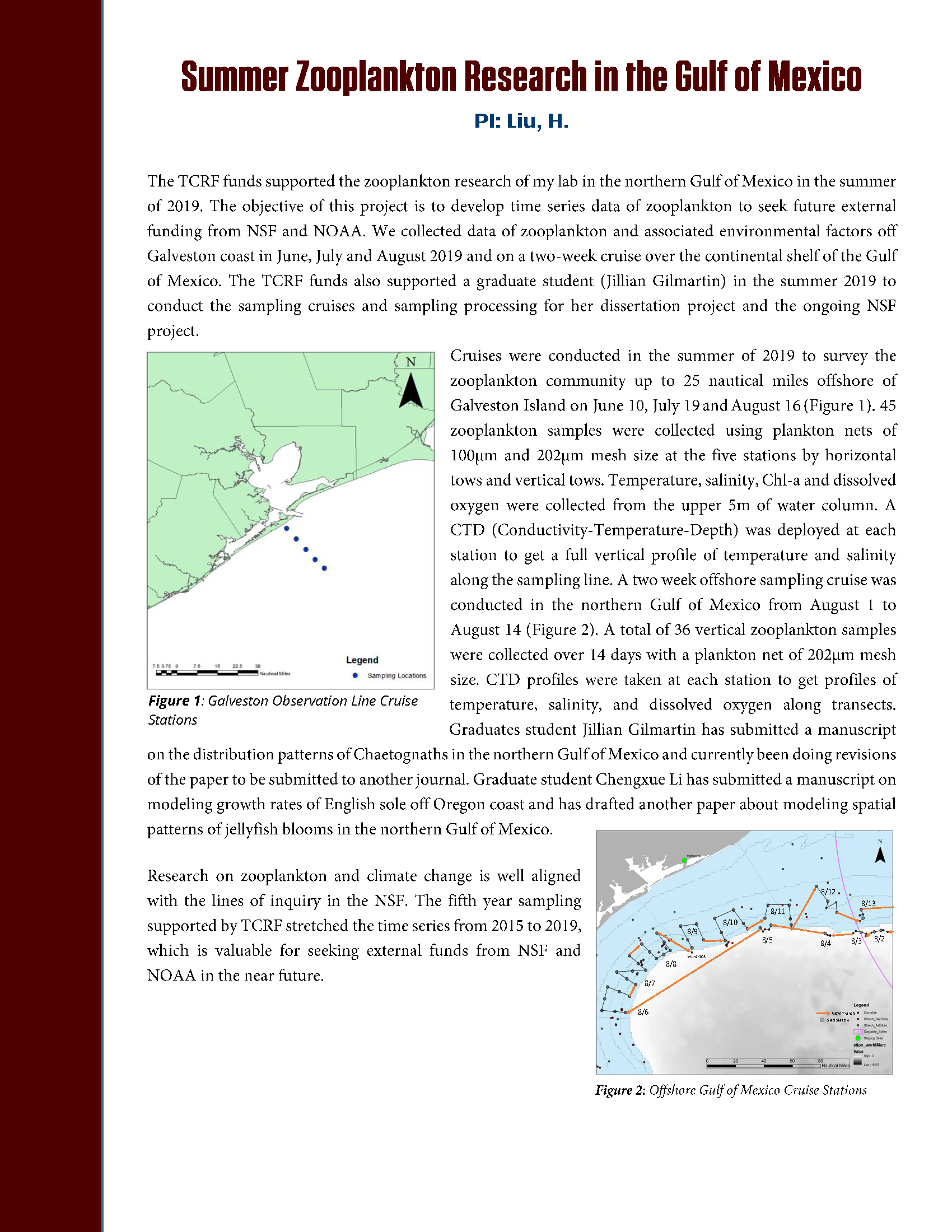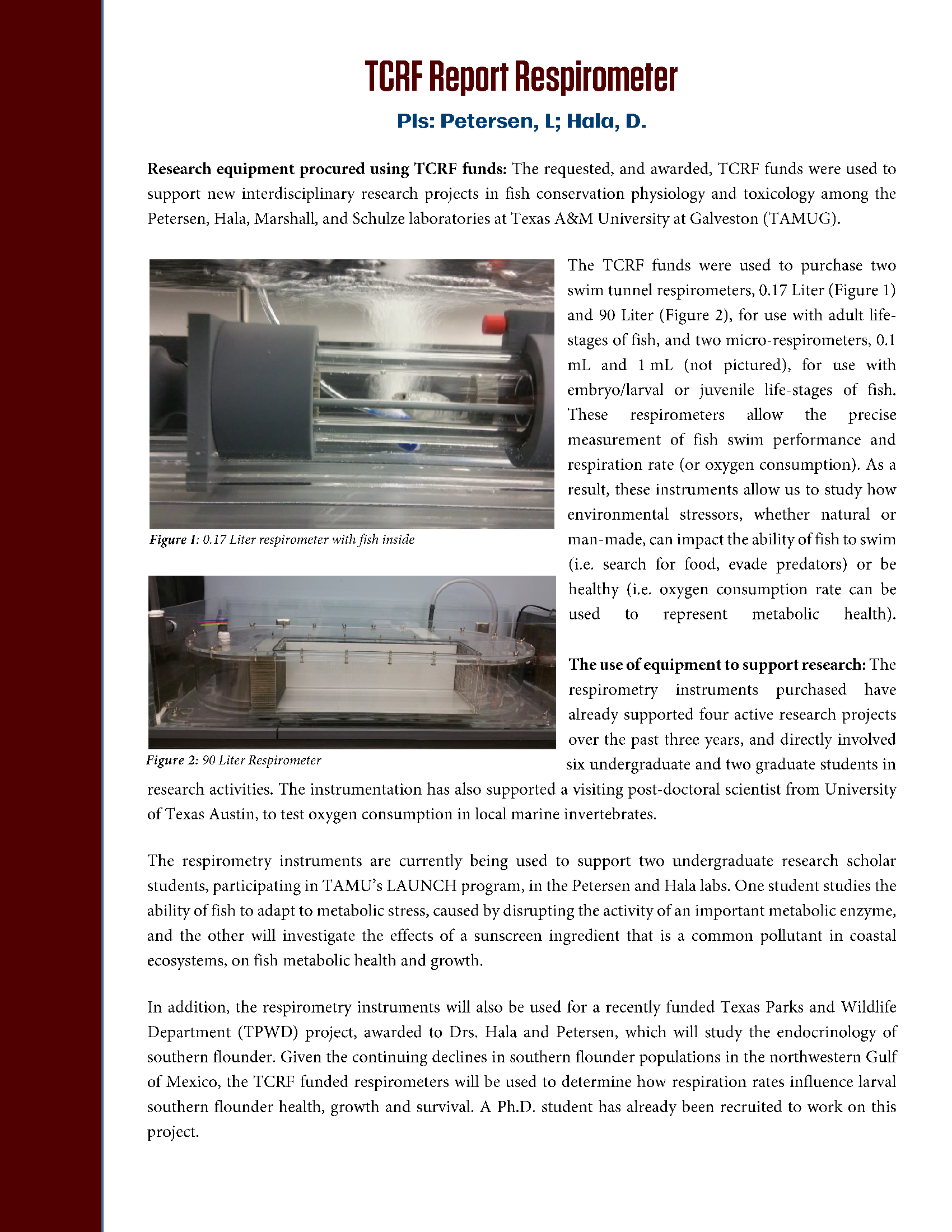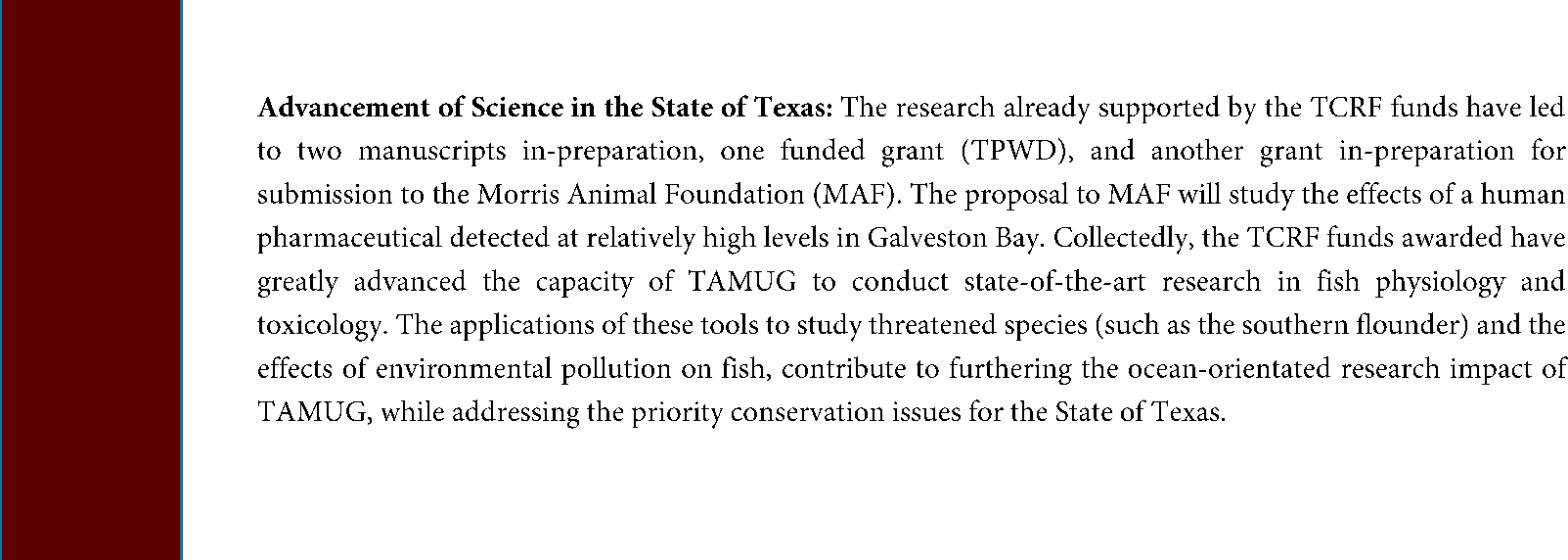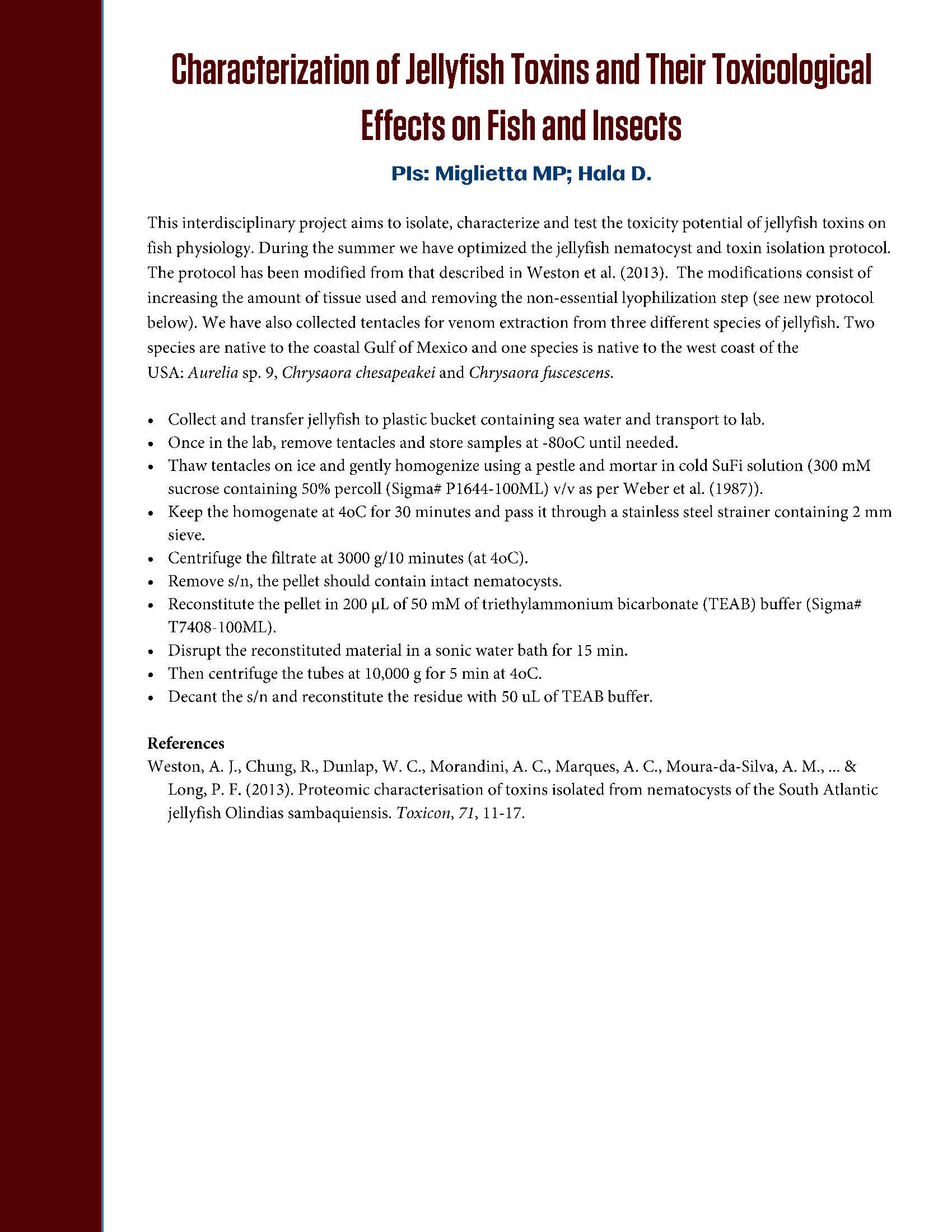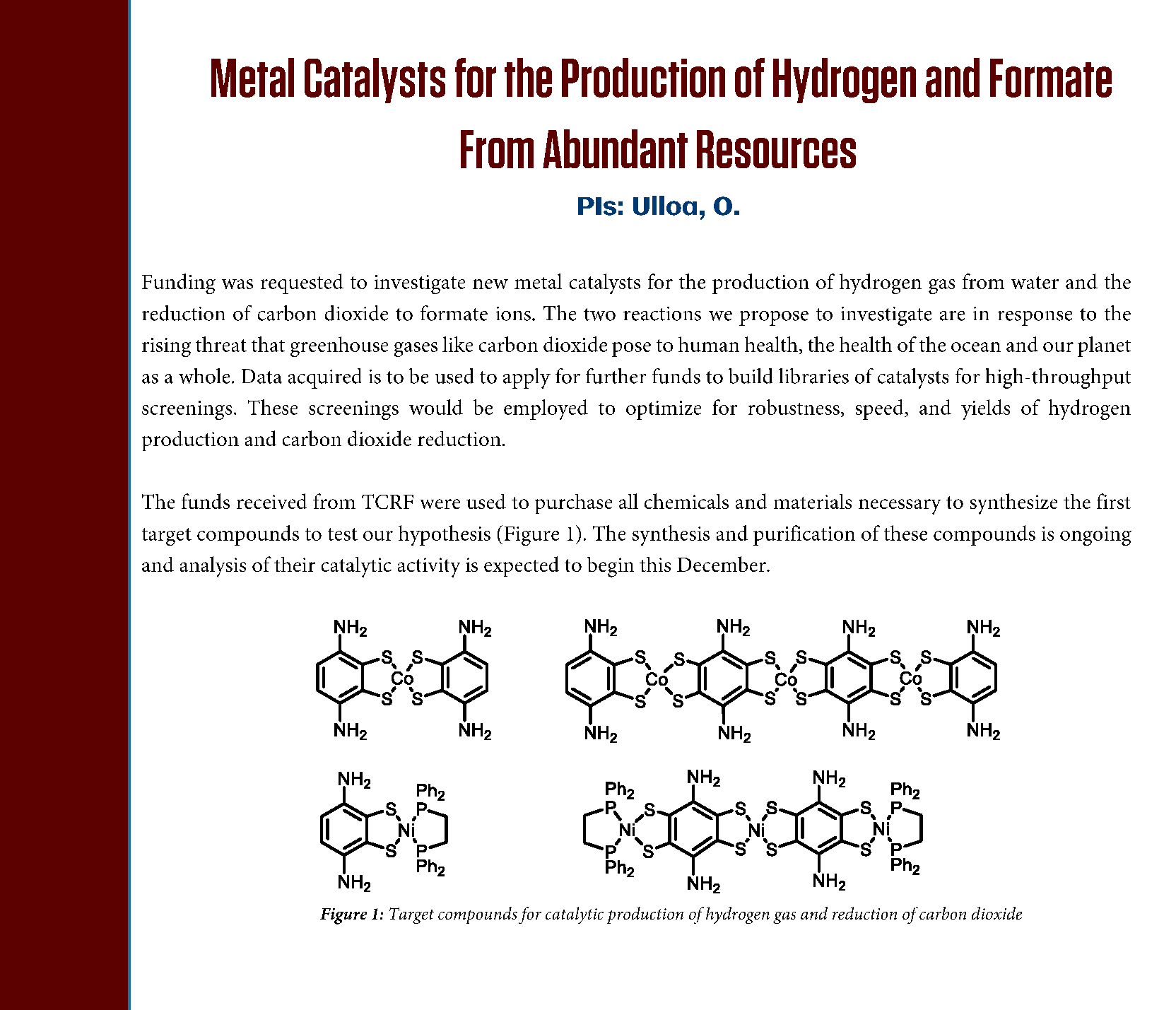
TAMUG Comprehensive Research Funds
TCRF Summer 2019
Funds are provided by the Texas Legislature to increase the research capacity of the Galveston Campus. Equipment purchased by these funds are considered to be a departmental/campus resource and should be made available to other interested TAMUG users. Publications resulting from this item should acknowledge support from Texas A&M.
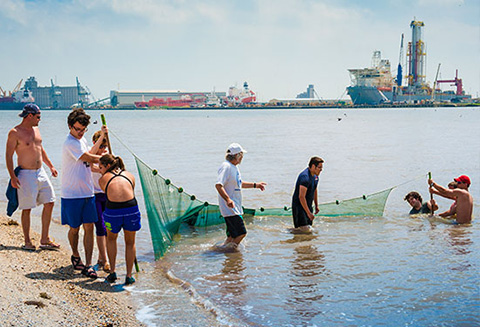
Title: Metal Catalysts for the Production of Hydrogen and Formate from Abundant Resources.
PI: Dr. Obellina Ulloa
Will investigate new metal catalysts for the production of hydrogen gas from water and the production of formate ions from carbon dioxide. The reactions being investigated are in response to the rising threat that greenhouse gases pose to human health, the health of the ocean, and our planet as a whole. For more information please contact Dr. Obellina Ulloa (ulloao@tamug.edu).
- Project Updates
Title: Developing a Travelling Exhibit: Preserving Old Central
PIs: Dr. Carol Bunch-Davis and Kristin Josvoll
Funding is provided for the design, development, and promotion of a year-long travelling exhibit and plan an exhibition Old Central Cultural Center's (OCCC) memorabilia and ephemera collection. For more information please contact Kristin Josvoll (kjosvoll@tamug.edu) or Dr. Carol Bunch-Davis (bunchc@tamug.edu).
- Project Updates
Title: Establishment of New Research and Educational Venues for the Development of a Model System for the Study of Coastal Circulation and the Functioning of Bays and Gulfs.
PI: Dr. Ayal Anis
Dr. Anis and his team will develop a model system for the study of coastal circulation and the functions of bays and gulfs. By studying these processes in bays they are looking to improve the understanding of the physical processes controlling the exchanges at bay entrances. For more information contact Dr. Ayal Anis (anisa@tamug.edu).
- Project Updates
Title: Development of Environmental Proxies from the Sediment Record within the Back Reef of the Mesoamerican Reef to Assess the Anthropogenic Impact on Ecosystem Health Due to Anthropogenic Impacts
PI: Dr. Timothy Dellapenna
The purpose of this project to collect reconnaissance scale data in support of the development of proposal to investigate the role changes in land use has had on the impact of primary productivity and marine ecosystem health with the back reef of the Mesoamerican Reef along the lagoon shelf of Belize. The Mesoamerican Reef (MAR) is the second largest barrier reef in the world and the largest in the western hemisphere. The reef is 15-25 km off shore and is separated from the coast by the MAR lagoonal-shelf. For more information please contact Dr. Timothy Dellapenna (dellapet@tamug.edu).
- Project Updates
Title: Developing Accurate First Floor Mapping to Transform Flood Risk Planning and Management
PIs: Drs. Wesley Highfield and Samuel Brody
This research initiative will integrate technology and methods used in historic preservation with flood risk modeling approaches to transform the way communities prepare for and recover from flooding events. Specifically, they will develop a rapid, accurate, and scalable digital methodology for capturing first-floor building elevations. This seemingly minor methodological improvement can result in one of the most significant advancements in natural hazards planning in recent decades while exposing students across multiple fields of study to cutting edge techniques. Their proposed multi-disciplinary research will be performed by faculty from TAMUG along with Dr. Brent Fortenberry at TAMU. TCRF funds will be used to purchase technology and software which will allow for faculty and students to process remotely-captured digital data for the elevation survey, onsite data collection, and drone operation. For more information please contact Dr. Wesley Highfield (highfiew@tamug.edu) or Dr. Samuel Brody (brodys@tamug.edu).
- Project Updates
Title: Updating Equipment to an Agilent 7890 Gas Chromatograph with a 7010B Triple Quadrupole Mass Detector
PIs: Drs. Karl Kaiser, Peter Santschi, Rainer Amon, and David Hala
TCRF funds will go towards the purchasing of an Agilent 7890 Gas Chromatograph with a 7010B Triple Quadrupole Mass Detector to serve as a replacement for 2 shared GC-MS instruments on campus. This instrument will replace the Varian 700GC with triple-quadrupole mass detector can no longer be serviced and the Thermo-GC, improving the research capabilities we have in chemical oceanography. For more information please contact Dr. Karl Kaiser (kaiserk@tamug.edu), or Dr. David Hala (halad@tamug.edu).
- Project Updates
Title: Supporting Dr. Hernando Barcosa as a Visiting Research Scientist
PI: Dr. Peter Santschi
ADDOMEX (Aggregation and Degradation of Dispersants and Oil by Microbial Exopolymers) has been a very successful project that is coming to an end. As part of this project, an important number of products have been created. Nonetheless, important results are still being processed, being important to publish them for the adequate dissemination of results. Through this project, three specific manuscripts will be finalized and submitted to important journals, helping the research impacts of TAMUG. For more information, please contact Dr. Peter Santschi (santschi@tamug.edu).
- Project Updates
Title: EXO2 Water Quality Sonde
PIs: Drs. Pete van Hengstum, Karl Kaiser, and Antonietta Quigg
The measurement of environmental parameters is an important part of any ecological study in marine science. Every day, new more accurate instruments are available, making important to have this technology for better results. TCRF is funding the purchase of a EXO2 Water Quality Sonde; this water quality logger will expand TAMUG’s capability for remote measurement of basic water quality parameters (depth, salinity, pH, temperature, Dissolved Oxygen) in addition to simultaneous measurement of Total Algae (in both salt and freshwater, both cyanobacteria and phytoplankton) and dissolved organic matter (as estimated through fluorescent dissolved organic matter). For more information please contact Dr. Pete van Hengstum (vanhenp@tamug.edu).
- Project Updates
Title: Obtaining an Elemental Science Laser MicroMill to Conduct and Expand TAMUG's Stable Isotope and Biotrace Analyses Abilities
PIs: Drs. Chris Marshall, David Wells, and Jay Rooker
An Elemental Science Laser MicroMill will allow the microsampling of hard structures such as bones and teeth, facilitating their analysis to perform detail studies of biotracers, helping to elucidate information about foraging or movement ecology in aquatic invertebrates. For more information please contact Dr. Chris Marshall (marshalc@tamug.edu).
- Project Updates
Title: Using New Technology to Study the Oceanographic Habitat and Ecology of Large Marine Mammals and Other Pelagic Species
PI: Dr. Randall Davis
TCRF funding is used to support a trip to study the foraging behavior, prey preference, and ocean habitat using the newest animal-borne video and data recorders (VDRs) on deep-diving New Zealand sea lions.The results will provide essential information on ocean habitat and ecology of a threatened species that will be used in a conservation management plan. It addition, the results will partially satisfy the requirements for the Doctoral Dissertation of Nathan Reed who is a graduate student in the Marine Biology IDP. Undergraduate students also will gain experience by assisting in calibration of the VDRs and data analysis. Finally, the results will demonstrate the advanced capabilities of the VDRs. For more information please contact Randall Davis (davisr@tamug.edu).
- Project Updates
Title: Summer Zooplankton Research in the Gulf of Mexico
PI: Dr. Hui Liu
Since 2015, Dr. Liu and his team has been performing research in zooplankton ecology in the Gulf of Mexico, mainly using cruises of opportunity. Together with zooplankton samples, Dr. Liu’s team collects a series of environmental parameter that increase the understanding of this important, yet understudied part of the trophic ecology of the area. Developing time series data of zooplankton is the foundation to seek future stronger external proposals. For more information please contact Dr. Hui Liu (liuh@tamug.edu).
- Project Updates
Title: Acquisition of Fish Embryo/larval Multiplate Systems, Ethovision XT, and DanioScope Software
PIs: Drs. David Hala and Lene Petersen
For a long time, toxicology studies have heavily rely in acute mortality studies, which expose indicator organisms to the conditions that cause their death in a short period of time. However, toxicity can also act chronically, affecting the function of organisms and their functions over long periods of time without killing them. Drs. Hala and Peterson study the effect of diverse substances in the metabolism of organisms, and the acquisition of this system will allow them to:
(1) Study the metabolic phenotype of zebrafish model for a human disease
(2) The Ethovision XT and DanioScope software will complement respirometry studies in the 2 swim tunnel respirometers. Overall both software and hardware will be used for cardiovascular physiology and metabolism studies of native Gulf of Mexico fish of which embryo/larval stages are under-studied.
(3) The multiplate system and Ethovision/DanioScrop software will further provide excellent student (undergraduate and graduate) projects. Many students have shown interest in toxicological/physiological studies on fish in conjunction with behavioral studies. Therefore student driven projects will enhance studies investigating physiological responses under environmental (hypoxia, temperature) and anthropogenic (pollutants, pharmaceuticals) stressors in various Gulf of Mexico species.
For more information please contact Drs. David Hala (halad@tamug.edu) or Lene Petersen (petersel@tamug.edu)
- Project Updates
Title: An Interdisciplinary Approach to Isolate, Characterize, and Test the Toxicity Potential of Jellyfish Toxins on Fish Physiology
PIs: Drs. Maria Pia Miglietta, David Hala, and Sing-Hoi Sze.
Jellyfish are important organisms in the Gulf of Mexico. They serve as food source for organisms but at the same time can create complications by feeding on commercial fish and disrupting fisheries by their accumulation in fishing gear. Lately, climate change and the introduction of alien jellyfish species have created concerns due to the potential implications in the increase of these organisms in the Gulf of Mexico, but also opportunities to create new drugs that can benefit humanity. This project seeks to:
1) Broaden the analytical scope of the existing project to characterize a broader range of toxins from additional jellyfish species that are native and introduced to the Gulf of Mexico
2) Perform toxicology studies with zebrafish to test whether the presence of jellyfish exudates or mucous (possibly containing toxins) may harm fish.
3) Develop rapid and minimally invasive methods to detect the presence of ‘biomarker’ peptides that may indicate the presence of jellyfish in a water column (providing early warning of impending jellyfish ‘blooms’).
4) Investigate effects of jellyfish toxins on fish physiology, such as effects on metabolic rate (i.e. oxygen consumption) and fish swimming performance (in collaboration with Dr. Lene Petersen, Fish Physiologist, MARB, TAMUG).
5) Explore the efficacy of jellyfish toxins to act as novel therapeutics against disease carrying insects and other invertebrate species (in collaboration with Prof. Patricia Pietrantonio, Dept. of Entomology, TAMU).
For more information please contact Dr. Maria Pia Miglietta (miglietm@tamug.edu).
- Project Updates
